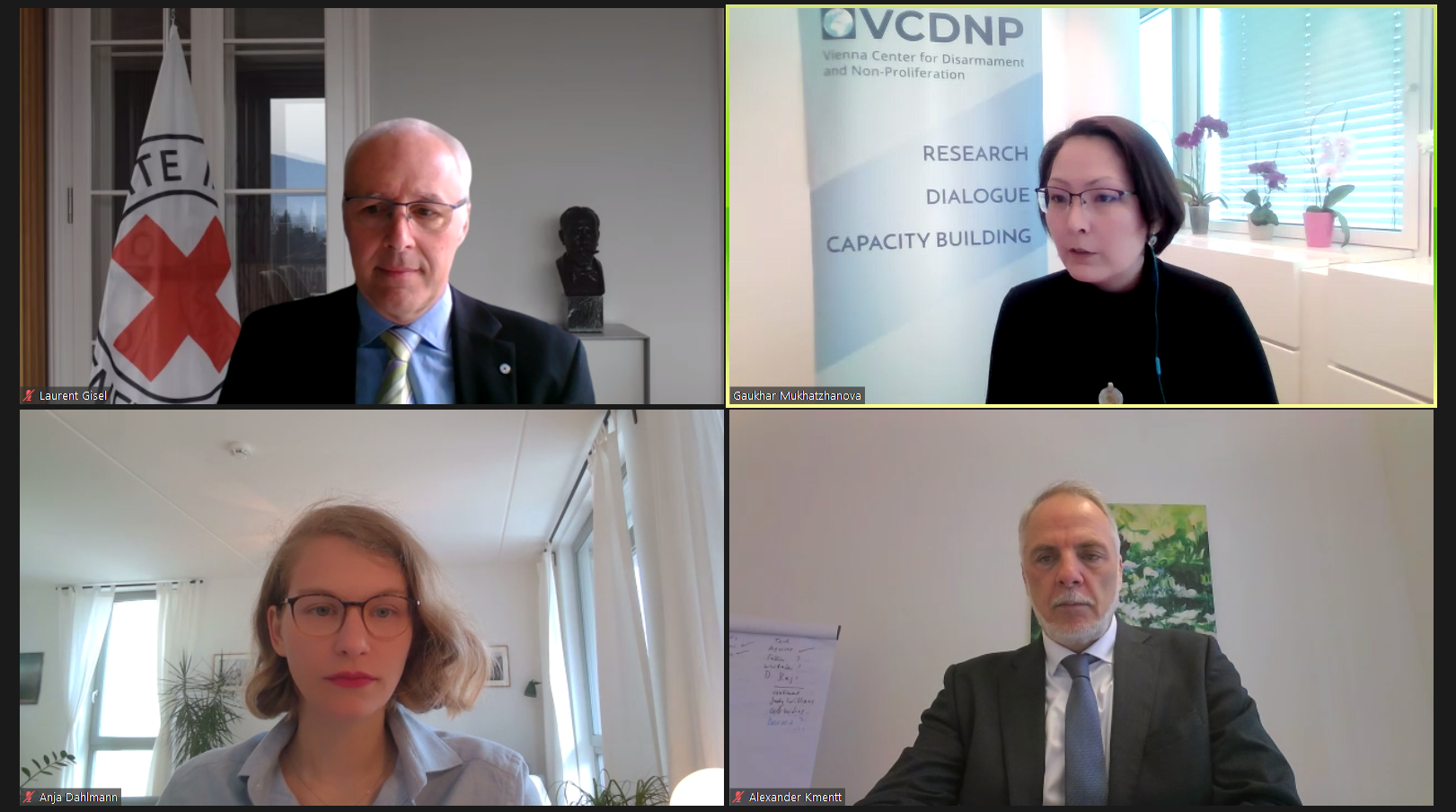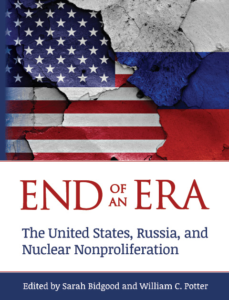
On 16 April 2024, the VCDNP held a webinar examining past and recent initiatives concerning lethal autonomous weapon systems (LAWS). Highlighting humanitarian, ethical, and legal considerations as well as the speed of technological developments, the panellists called for urgent action to adopt legally binding regulations on autonomous weapons systems.
Moderated by Gaukhar Mukhatzhanova, Director of the International Organizations and Non‑Proliferation Program at the VCDNP, the panel of speakers included:
Anja Dahlmann explained that concerns about the development and potential use of LAWS and the push for considering their regulation came from civil society and academia, through the Campaign to Stop Killer Robots. Civil society continues to play an important role in informing and framing the current discussion. Ms. Dahlmann provided an overview of the multilateral debates on autonomous weapons systems over the past decade, particularly in the context of the Convention on Certain Conventional Weapons (CCW) and its Group of Governmental Experts (GGE) on Emerging Technologies in the Area of LAWS. She highlighted the 2019 session as the turning point in the discussions, when the GGE endorsed 11 guiding principles for the development and use of autonomous weapons systems. The principles affirm that international humanitarian law applies to autonomous weapons systems and that humans must maintain control and responsibility to use autonomous weapons systems.
Ms. Dahlmann further observed that the GGE has made little progress since 2019 towards agreeing on legally binding regulations, and that there was little reason to expect a change in this dynamic due to lack of consensus on the subject among CCW States Parties. The emergence of parallel initiatives, including the UN General Assembly (UNGA) resolution 78/241 on LAWS adopted in late 2023, regional meetings, and the international conference on autonomous weapons systems scheduled to taking place in Vienna in April 2024, indicate the majority of states’ willingness to move the discussion forward towards concluding a treaty.
Laurent Gisel highlighted the urgency of taking action, arguing that the current use of autonomous weapons systems to select and engage targets presents a disturbing trend that could change the way wars are fought and contribute to increased global instability and heightened tensions. As technology advances, he noted, autonomous weapons systems will likely offer expanded operational parameters, which could create the perception of reduced risk to military forces and civilians, lowering the threshold for engaging in conflicts and using force. Mr. Gisel stressed, therefore, that the issue was relevant not only for states developing autonomous weapons systems but for all states and their populations.
Commending states for agreeing that international law, in particular international humanitarian law (IHL), applies to autonomous weapons systems, he emphasised the need to adopt more specific rules to clarify the application of IHL and address the legal, humanitarian, ethical and security concerns raised by such systems. Reiterating its earlier call for the negotiation of a legally binding instrument to regulate LAWS, the ICRC further explained its concerns and recommendations in a recent submission for the UN Secretary-General’s report pursuant to UNGA Resolution 78/241.
Ambassador Alexander Kmentt elaborated how the issue of autonomous weapons systems goes beyond IHL and raises profound ethical questions regarding the role of humans in the use of force and what type of control must never be relinquished to machines. He argued that decisions made now will have an impact on the future of humanity and armed conflict. The need to have a broader discussion than the GGE mandate allows, involving more states and civil society, has motivated the Austrian government to hold an international conference on 29 and 30 April 2024, “Humanity at a Crossroads: Autonomous Weapons Systems and the Challenge of Regulation.”
The conference programme is designed to examine autonomous weapons systems from a technical, ethical, legal, and security perspective. The organisers hope to build political momentum, underscore the urgency of the issue, and create the necessary pressure to move forward on developing new international rules on autonomous weapons systems. Ambassador Kmentt noted that, while there will be no negotiated outcome document, the conference Chair will produce a summary of discussions that will also be submitted to the UN Secretary‑General.
Addressing questions from the online audience, the panellists further elaborated on approaches to a potential legally binding instrument regulating LAWS. They agreed that, given the rapidly changing technology, it was necessary for the future treaty to focus on the human role and define the functions and the role of the human agency vis-à-vis the weapons systems. It was also suggested that any use of autonomous weapons systems against human targets should be prohibited. The speakers stressed that regulation is not meant to be hostile towards technology or industry, but rather to provide guidelines, emphasising the benefits of pre-emptively agreeing on red lines and standards rather than trying to prohibit something already in use.
The webinar is part of a series conducted with support of the Austrian Federal Ministry for European and International Affairs.



By continuing to use the site, you agree to the use of cookies. more information
The cookie settings on this website are set to "allow cookies" to give you the best browsing experience possible. If you continue to use this website without changing your cookie settings or you click "Accept" below then you are consenting to this.